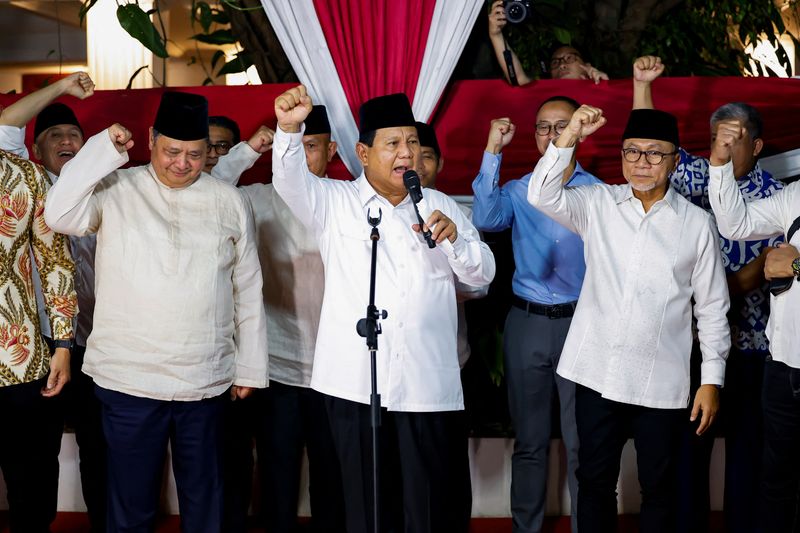By Ananda Teresia
JAKARTA (Reuters) – A court in Indonesia will on Monday deliver its verdict on two challenges to the outcome of February’s presidential election, after losing candidates petitioned for a re-run and alleged the state had interfered in favour of winner Prabowo Subianto.
The two rivals of Defence Minister and former special forces commander Prabowo have both asked the Constitutional Court to disqualify him from a contest he won by a huge margin, arguing widespread distribution of social aid in key areas had swayed the vote in his favour.
Prabowo, who won 58% of the votes, has dismissed that as baseless.
Former governors Anies Baswedan and Ganjar Pranowo also alleged tacit support from the hugely popular President Joko Widodo had gifted Prabowo an unfair advantage, as did the inclusion of the outgoing leader’s son as his running mate, owing to the same court’s decision to change eligibility rules.
Anies and Ganjar, who won about 25% and 16% of votes respectively, have argued Gibran Rakabuming Raka, 36, should not have been allowed to run as Prabowo’s vice-presidential candidate and should also be disqualified.
The October decision by the Constitutional Court, which at the time was headed by the president’s brother-in-law, changed a rule on the minimum age of candidates just a few days ahead of registration, which enabled Gibran to join Prabowo’s ticket.
The chief justice was reprimanded by an ethics panel for intentionally allowing “intervention from an external party”, which it did not name. He was later barred from taking part in election-related cases.
Prabowo and the outgoing administration of Jokowi, as the president is known, have rejected all allegations of interference. Cabinet ministers during the court hearings denied social aid was deployed for political purposes.
Jokowi came under intense intense scrutiny in the run-up to the election, with allegations from critics that he abused his position to favour Prabowo, with the aim of preserving his legacy after a decade in charge of Southeast Asia’s biggest economy.
Former Jakarta governor Anies has warned of a democratic backslide in Indonesia, saying the country, which was ruled for 32 years by the late strongman Suharto until his fall in 1998, was at risk of returning to its authoritarian past.
According to some legal experts, the court could dismiss the complaints altogether, order elections be held again in certain areas, or hold a new nationwide ballot without Prabowo and Gibran, as both Anies and Ganjar have sought.
The latter would be highly unlikely, according to some analysts.
“The decision to include Gibran was issued by the Constitutional Court, so it’s unlikely the court will contradict its previous decision,” said Titi Anggraini, a legal expert from the University of Indonesia.
(Writing by Kate Lamb; Editing by Martin Petty)
